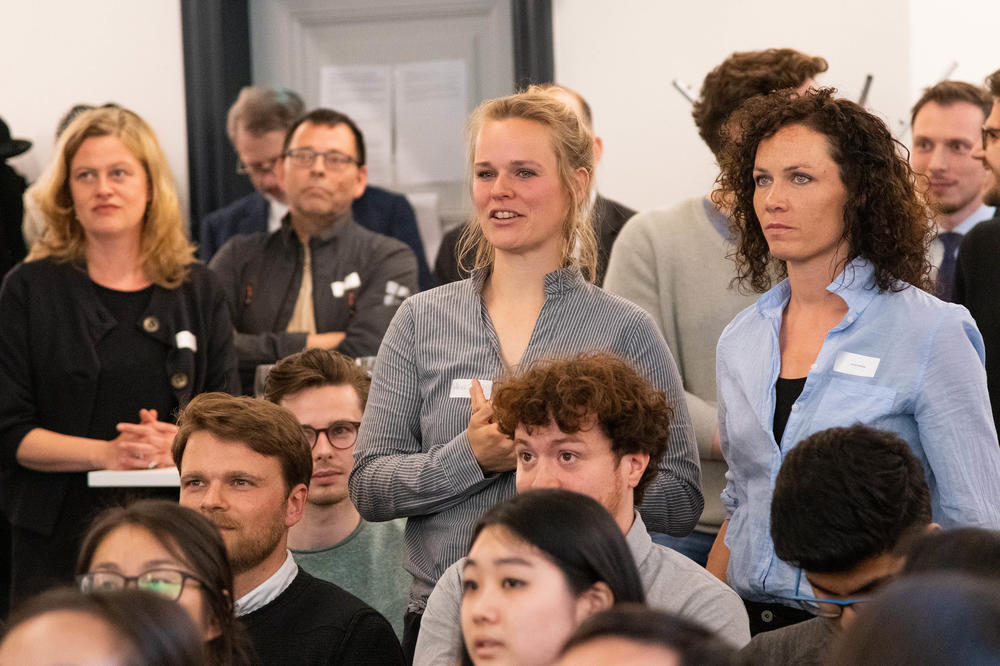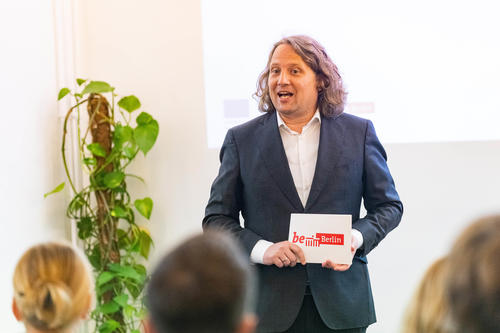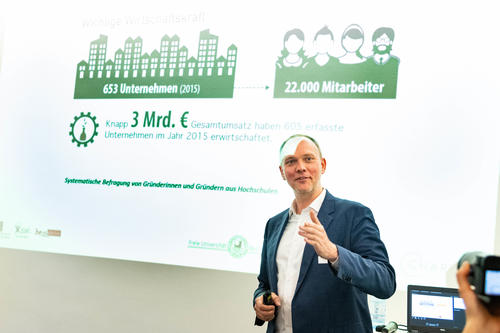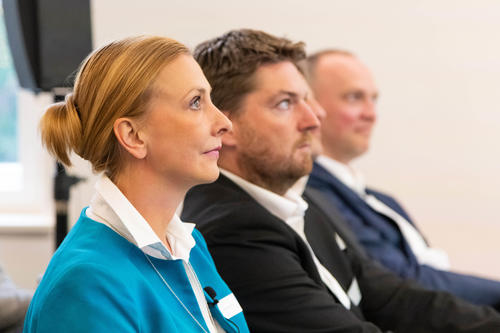“Setting up your own company means tackling new problems every day.”
The three major Berlin universities and Charité have been awarding “Berliner Startup Stipendium” grants together since 2016. The results speak for themselves.
Jun 13, 2019
Up to now, 88 Berliner Startup Stipendium grants have been awarded to members of the three major Berlin universities and Charité. Many company founders benefit from the networking meetings.
Image Credit: Daniel Pasche
The idea is innovative and has market potential, and the team is well positioned for success – but for investors or large support programs, the project still has quite a way to go. In cases like this, Freie Universität Berlin, Charité - Universitätsmedizin Berlin, Humboldt-Universität zu Berlin, and Technische Universität Berlin jointly offer the Berliner Startup Stipendium. The funds can be made available quickly and without a lot of bureaucracy. Entitled University Startup Factory, the Berliner Startup Stipendium program is funded by the Berlin Senate Department for Economics, Energy, and Public Enterprises as well as the European Social Fund. Two to four team members receive 2,000 euros per month over a period of six months; an extension for another six months is also possible. The teams are supervised by the start-up centers at the respective universities.
An integral part of the project is a comprehensive evaluation. The first results from qualitative and quantitative surveys were presented at a networking meeting at Freie Universität Berlin’s start-up incubator.
During the pilot phase from August 2016 to March 2018, 62 teams of two to four people applied for the grant. Each application was preceded by a preliminary interview at the start-up support office at the respective universities. During that phase, 31 teams were selected to present their projects in person, and 26 start-up projects were finally chosen for funding. By January 2019, 19 business start-ups had emerged – meaning that around three-quarters of the projects were implemented during the survey period.
In the second phase of the project, which is still ongoing, the number of applications and the number of funded start-ups has increased significantly: 112 teams applied, 61 teams were granted funding, and 11 of those have already founded a company. Many of the funded companies are already seeing positive results.
In a welcoming address at the networking meeting, Christian Rickerts, State Secretary in the Berlin Senate Department for Economics, Energy and Enterprises, thanked the universities in Berlin for attracting young international talent.
Image Credit: Daniel Pasche
Volker Hofmann, the head of knowledge transfer at Humboldt-Universität, pointed out that university spin-offs are an economic factor in Berlin.
Image Credit: Daniel Pasche
Ina Budde, founder of the start-up circular.fashion UG (limited liability), and her team funded by Freie Universität have developed a circulation system for sustainable fashion. A digital platform accompanies and controls the cycle of each garment, from design, through wearing, to recycling. In April 2019, circular.fashion won the H&M Foundation Global Change Award, worth 300,000 euros.
Future of Voice GmbH, founded at Technische Universität Berlin by Tilmann Böhme, Malte Kosub, and Stefan Ostwald, develops applications for the voice-controlled assistance systems Alexa and Google Assistant on behalf of large companies. Their customers include WWF, Evonik Industries AG, and the ERGO Group.
Tim Vogelsang and André Rieck’s Octorank Innovation UG (limited liability), which is funded by Humboldt-Universität, has acquired big customers like Deutsche Telekom and Vattenfall. Companies, developers, musicians, and copywriters use their platform to receive feedback on innovations and designs.
In 2017, Laura Büchler and Isabella Hillmer from the team at GHOST - feel it received the “Smart Wearables x Smart Textiles” award by the Senate Department for Economics, Energy, and Public Enterprises, worth 10,000 euros. The founders, who are funded by Charité – Universitätsmedizin Berlin, are working on a glove for people suffering from nerve damage in their hands. It is intended to give them back their sense of touch and sensitivity to temperatures.
Looking to the future: Aneta Bärwolf (Freie Universität), Florian Hoos (Technische Universität), and Volker Hofmann (Humboldt-Universität) are preparing a proposal for a new project to be funded with a Berliner Startup Stipendium grant.
Image Credit: Daniel Pasche
“The program has really taken off at full speed.” Volker Hofmann
For the evaluation of the Berlin Startup Stipendium, grant holders were also asked for detailed qualitative feedback. The fact that there was not a long waiting period between the time of application and the announcement of the results proved to be a great advantage for the participants. A jury consisting of members of the four universities and external jurors decided within a very short time, so that the uncertainty did not block the development of the projects. Participants also praised the procedure from the proposal to the actual transfer of money to the bank account. In addition, there were top marks for services such as start-up rooms, access to laboratories, consultations, establishing contacts, and networking events. “Setting up your own company means tackling new problems every day,” says Florian Hoos, director of the Center for Entrepreneurship at Technische Universität Berlin. Although university employees in the start-up support offices could not relieve entrepreneurs of this challenge, they could often guide them to finding solutions based on their many years of experience and their expertise and knowledge of the Berlin start-up scene
The main conclusion of the evaluation: many things are already working well; some things can still be improved. “The program has really taken off at full speed,” says Volker Hofmann, head of Team Knowledge Transfer at Humboldt-Universität zu Berlin. That is why the three universities and Charité have already worked on a proposal to continue awarding the scholarships for another two years. The concept will be submitted to the Senate Department by June 30, 2019. “Naturally, we want to maintain what has proven to be a success,” says Volker Hofmann. “We will, however, additionally focus on internationalization and tie in with the Berlin Senate’s Smart City Strategy.”
“We also make sure that the start-up ideas we promote are sustainable.” Aneta Bärwolf
Aneta Bärwolf, project manager for the Berliner Startup Stipendium at Freie Universität, emphasizes another aspect of university start-up funding: “We have similar criteria to private investors when it comes to eligible ideas, such as the degree of innovation and market opportunities of a product. We also make sure that the start-up ideas we promote are sustainable, and that the prospective entrepreneurs take responsibility for the future.”
Further Information
The application period is closed.
Link to the list of teams winning Berliner Startup Stipendium grants from 2016 to 2019




